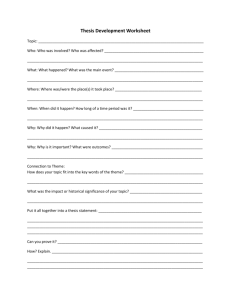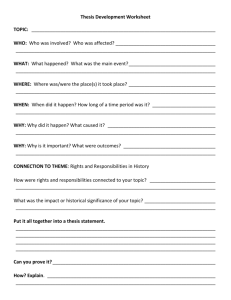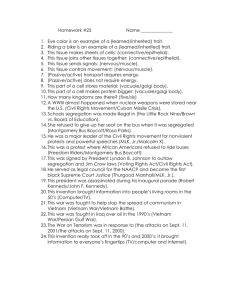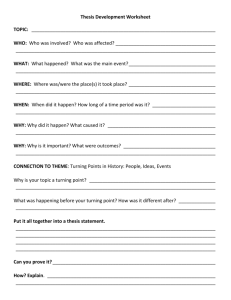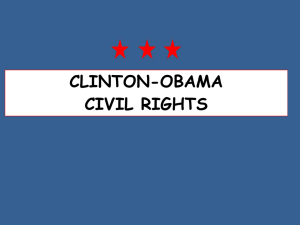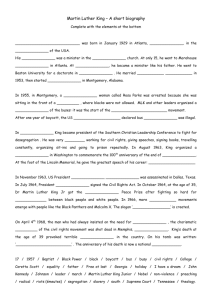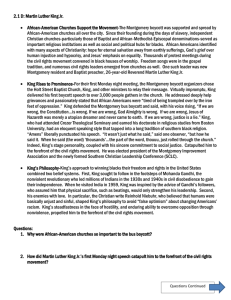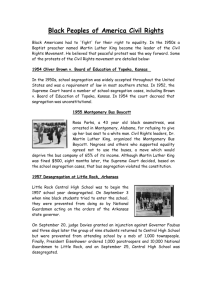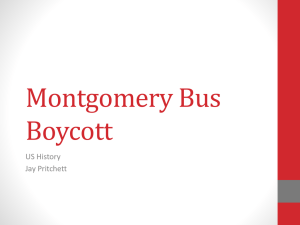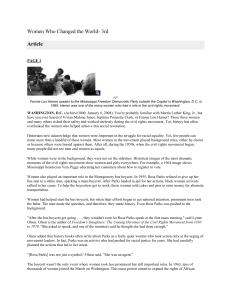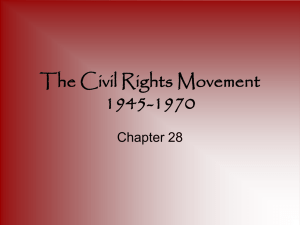The Thesis Statement.doc
advertisement
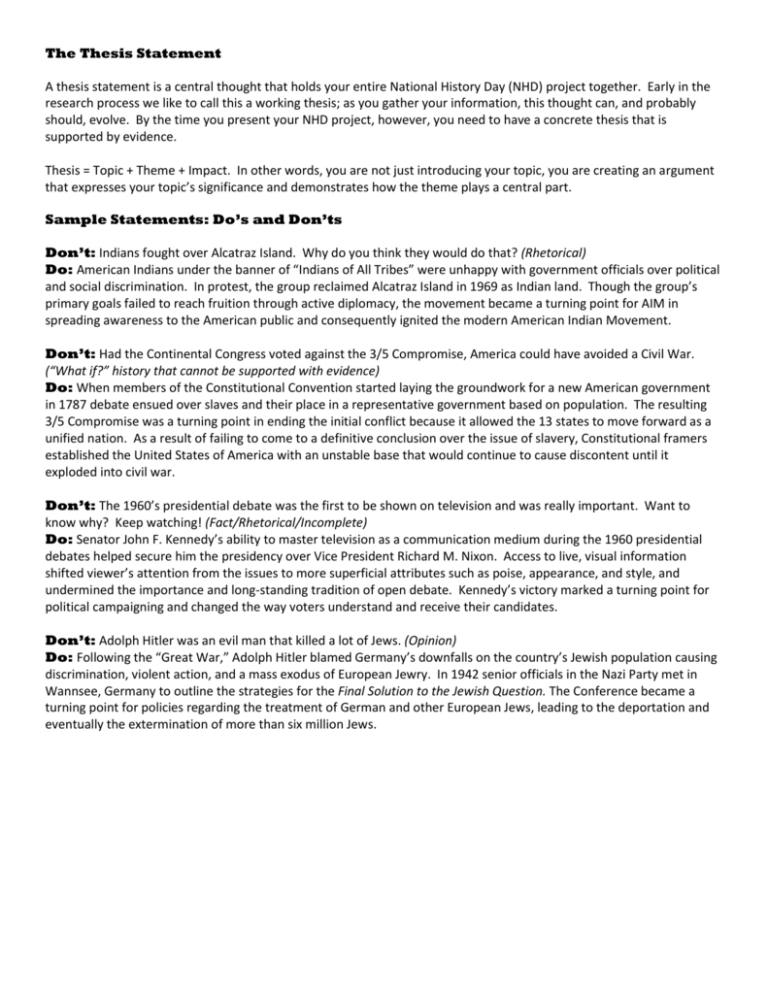
The Thesis Statement A thesis statement is a central thought that holds your entire National History Day (NHD) project together. Early in the research process we like to call this a working thesis; as you gather your information, this thought can, and probably should, evolve. By the time you present your NHD project, however, you need to have a concrete thesis that is supported by evidence. Thesis = Topic + Theme + Impact. In other words, you are not just introducing your topic, you are creating an argument that expresses your topic’s significance and demonstrates how the theme plays a central part. Sample Statements: Do’s and Don’ts Don’t: Indians fought over Alcatraz Island. Why do you think they would do that? (Rhetorical) Do: American Indians under the banner of “Indians of All Tribes” were unhappy with government officials over political and social discrimination. In protest, the group reclaimed Alcatraz Island in 1969 as Indian land. Though the group’s primary goals failed to reach fruition through active diplomacy, the movement became a turning point for AIM in spreading awareness to the American public and consequently ignited the modern American Indian Movement. Don’t: Had the Continental Congress voted against the 3/5 Compromise, America could have avoided a Civil War. (“What if?” history that cannot be supported with evidence) Do: When members of the Constitutional Convention started laying the groundwork for a new American government in 1787 debate ensued over slaves and their place in a representative government based on population. The resulting 3/5 Compromise was a turning point in ending the initial conflict because it allowed the 13 states to move forward as a unified nation. As a result of failing to come to a definitive conclusion over the issue of slavery, Constitutional framers established the United States of America with an unstable base that would continue to cause discontent until it exploded into civil war. Don’t: The 1960’s presidential debate was the first to be shown on television and was really important. Want to know why? Keep watching! (Fact/Rhetorical/Incomplete) Do: Senator John F. Kennedy’s ability to master television as a communication medium during the 1960 presidential debates helped secure him the presidency over Vice President Richard M. Nixon. Access to live, visual information shifted viewer’s attention from the issues to more superficial attributes such as poise, appearance, and style, and undermined the importance and long-standing tradition of open debate. Kennedy’s victory marked a turning point for political campaigning and changed the way voters understand and receive their candidates. Don’t: Adolph Hitler was an evil man that killed a lot of Jews. (Opinion) Do: Following the “Great War,” Adolph Hitler blamed Germany’s downfalls on the country’s Jewish population causing discrimination, violent action, and a mass exodus of European Jewry. In 1942 senior officials in the Nazi Party met in Wannsee, Germany to outline the strategies for the Final Solution to the Jewish Question. The Conference became a turning point for policies regarding the treatment of German and other European Jews, leading to the deportation and eventually the extermination of more than six million Jews. In your research, you should be able to identify: WHO: Who was involved? Who was affected? WHAT: What happened? What was the main event? WHERE: Where did it take place? WHEN: When did it happen? How long of a time period was it? WHY: Why did it happen? What caused it? WHY: Why is it important? What were outcomes? Consider your own working thesis and identify: The central focus of your documentary: The “Exploration”: The “Encounter”: The “Exchange”: Historical Significance: What must be proven in order for this statement to be true? What evidence will we need to support our claims? Where might we find this evidence (consider documents, statements, opinions, and other sources)? WRITE YOUR THESIS HERE: 1. Topic: 2. Integrate the word(s) “EXPLORE/ATION”, “ENCOUNTER”, and/or “EXCHANGE” into the statement: 3. How did your topic change an individual? Community? Country? World? What is the significance of your topic? Why is it a big deal? Evaluate the thesis statement. Ask yourself these questions: 1. Is it clear what the project will be about? 2. Is it arguable? Is there something that has to be proven? 3. Will research be necessary to prove the thesis? 4. Is there only one main idea? 5. Is it about something in the past that is important? Here’s a good example: Rosa Parks and the Montgomery Bus Boycott WHO: Who was involved? Who was affected? Rosa Parks; citizens in Montgomery, Alabama; civil rights leaders, Montgomery’s city government officials. WHAT: What happened? What was the main event? Rosa Parks refused to give up her bus seat to a white passenger, which violated a law enforcing segregation on Montgomery city buses. She was arrested and went to jail. Civil rights leaders, including Martin Luther King, Jr., organized a boycott of buses and challenged the law as unconstitutional. WHERE: Where was/were the place(s) it took place? Montgomery, Alabama WHEN: When did it happen? How long of a time period was it? Parks was arrested on Dec. 1, 1955; the boycott started on Dec. 5 and lasted for 382 days. WHY: Why did it happen? What caused it? Civil rights leaders wanted to overturn segregation laws. WHY: Why is it important? What were the outcomes? The boycott forced change in Montgomery and succeeded in overturning the law requiring segregation on public transportation. This success inspired other civil rights protests and helped Martin Luther King, Jr. develop his non-violent strategies to fight segregation. THEME CONNECTION: Rights & Responsibilities in History • What is the topic’s connection to rights and responsibilities in history? African Americans asserted their civil rights under the 14th Amendment and sought to break down segregation in the south. Civil rights activists like Rosa Parks and Martin Luther King, Jr. took on the responsibility of challenging the city of Montgomery. City leaders were responsible for upholding existing laws and maintaining segregation. • Why is your topic significant in history? What impact did it have? Before the Montgomery Bus Boycott, the impact of the Brown v. Board of Education Supreme Court decision was limited to the segregation of schools. Civil rights leaders used the Montgomery Bus Boycott to expand the protection of equal rights to public transportation. This effectively ended the "Separate but equal" standard established in the Plessy v. Ferguson decision. The success of the boycott inspired other challenges to segregation and was a turning point in the Civil Rights Movement as new leaders, like Martin Luther King, Jr., emerged from the struggle in Montgomery. Put it all together into a thesis statement: In 1955, Rosa Parks took the responsibility for initiating a civil rights confrontation when she refused to give up her bus seat to a white passenger in Montgomery, Alabama. The resulting bus boycott and a successful Supreme Court lawsuit demonstrated the effectiveness of non-violent economic protest and legal strategies in securing equal rights.
